Currency
Recombinant zebrafish FGF-2 (bFGF) protein (Qk002)
Zebrafish fibroblast growth factor 2 (FGF-2/bFGF/basic FGF) has been used extensively to support the maintenance and proliferation of human and mouse induced pluripotent (iPSC) and embryonic stem cells (ESC), used in the original Ludwig et al feeder-free culture of embryonic stem cells protocols 1-3.
High purity 17 kDa FGF2 / bFGF protein, animal origin-free (AOF) and carrier-protein free (CF). This version of recombinant zebrafish FGF2 is used by the core facility at the Cambridge Stem Cell Institute, UK and historically by many of the stem cell groups based at University of Cambridge.
Orders are typically shipped same or next day (except Friday).
Easy world-wide ordering, direct or through our distributors.
1000µg will be despatched as 2 x 500µg
Fast and free shipping.
Buy online with secure credit card or purchase order.
For any questions, please email orders@qkine.com
Summary
High purity zebrafish Danio rerio FGF2/bFGF (residues 2-154, Uniprot: B3DGE3) as described in Ludwig et al.2.
>98%, by SDS-PAGE quantitative densitometry
17 kDa
Expressed in E. coli
Animal origin-free (AOF) and carrier protein-free.
Manufactured in our Cambridge, UK laboratories
Lyophilized from Tris/NaCl/CyS/mannitol
Resuspend in water at >100 µg/ml, prepare single use aliquots, add carrier protein if desired, store frozen at -20 oC (short-term) or -80 oC (long-term)
Featured applications
Stem cell expansion and maintenance; recombinant zebrafish FGF2 is used by the core facility at the Cambridge Stem Cell Institute, UK and historically by many of the stem cell groups based at University of Cambridge
- Ludwig, T. E. et al. Derivation of human embryonic stem cells in defined conditions. Nat. Biotechnol. 24, 185–187 (2006).
- Ludwig, T. E. et al. Feeder-independent culture of human embryonic stem cells. Nat. Methods 3, 637–646 (2006).
- Chen, G., Gulbranson, D. R., Yu, P., Hou, Z. & Thomson, J. A. Thermal stability of fibroblast growth factor protein is a determinant factor in regulating self-renewal, differentiation, and reprogramming in human pluripotent stem cells. Stem Cells 30, 623–30 (2012).
Related discovery kit
This protein has recently been reformulated and will now arrive lyophilized. This change has been made to provide enhanced stability to ensure that we offer the best customer experience in terms of shipping and storage and to align with our company sustainability goals. Please visit our reconstitution page or contact customerservice@qkine.com for further information or to request the previous datasheet.
Bioactivity
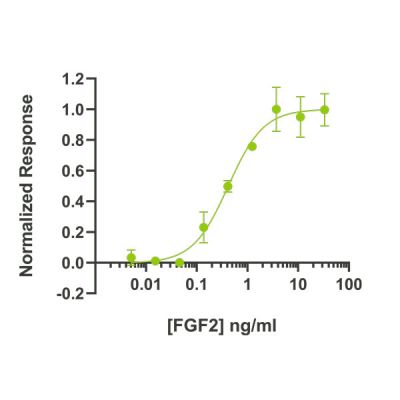
Zebrafish FGF2 activity is determined using the Promega serum response element luciferase reporter assay (*) in transfected HEK293T cells. Cells are treated in triplicate with a serial dilution of FGF2 for 6 hours. Firefly luciferase activity is measured and normalized to the control Renilla luciferase activity. EC50 = 0.42 ng/ml (24.7 pM). Data are from Qk002 batch #011 *Promega pGL4.33[luc2P/SRE/Hygro] #E1340
Purity
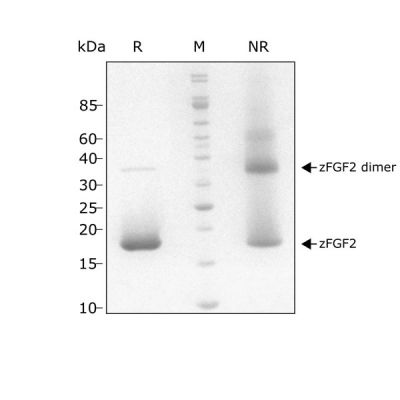
FGF2 migrates as major band at 17 kDa in non-reducing (-βME) conditions and upon reduction (+βME). The higher molecular mass band at 35 kDa is a dimer that we always see in our highly purified zebrafish FGF2 protein, the presence of this does not affect biological activity. Purified recombinant protein (7 µg) was resolved using 15% w/v SDS-PAGE in reduced (+β-mercaptothanol, R) and non-reduced conditions (NR) and stained with Coomassie Brilliant Blue R250. Data from Qk002 lot #011
Further quality assays
Mass spectrometry: single species with expected mass
Endotoxin: <0.005 EU/μg protein (below level of detection)
Recovery from stock vial: >95%
We are a company founded and run by scientists to provide a service and support innovation in stem cell biology and regenerative medicine. All our products are exceptionally high purity, with complete characterisation and bioactivity analysis on every lot.
Protein background
Fibroblast growth factors (FGFs) are a family of growth factors which regulate a wide range of essential biological functions including cell proliferation and survival, migration and differentiation [1]. The human FGF family has 18-22 members grouped into 6-7 subfamilies based on sequence homology and phylogeny [2]. The FGF family of growth factors have critical roles during both vertebrate and invertebrate embryonic development, in adult cells they modulate tissue maintenance, wound healing and angiogenesis [1,2].
The FGF ligands bind to 4 receptors (FGFR1-4), transmembrane receptors with intracellular tyrosine kinase activity [2, 3]. Once activated FGFRs recruit Src homology-2 (SH2) or phosphotyrosine binding (PTB) domain-containing signaling proteins leading to activation of intracellular signaling pathways [1]. The main signaling pathways activated by FGF binding are the RAS/MAP kinase pathway, PI3 kinase/Akt pathway, and PLCγ pathways [1-3].
Fibroblast growth factor 2 (FGF-2) also known as basic fibroblast growth factor (bFGF) has a broad range of physiological roles including regulation of cell growth, survival and proliferation. FGF-2 is one of the FGFs which binds to and signals through all four of the FGFRs [4].
FGF-2 is an essential growth factor for the maintenance of pluripotency in human embryonic stem cells (ESCs), induced pluripotent stem cells (iPSCs) [4] and mesenchymal stem cells (MSCs) [5]. FGF2 preserves pluripotency through interaction with PI3 kinase/Akt, ERK1/2, JAK/STAT and PLCγ pathways by activation of Activin A. In feeder culture systems FGF-2 stimulates production of essential growth factors and cytokines from the feeder layer [5].
Publications
Limited oxygen availability in standard cell culture alters metabolism and function in terminally-differentiated cells.
In The Embo Journal on 5 April 2024 by Tan, J., Virtue, S., et al.
Genome-wide screening in pluripotent cells identifies Mtf1 as a suppressor of mutant huntingtin toxicity.
In Nature Communications on 5 July 2023 by Ferlazzo, G. M., Gambetta, A. M., et al.
Capture of Mouse and Human Stem Cells with Features of Formative Pluripotency.
In Cell Stem Cell on 4 March 2021 by Kinoshita, M., Barber, M., et al.
The transcriptional regulator ZNF398 mediates pluripotency and epithelial character downstream of TGF-beta in human PSCs.
In Nature Communications on 12 May 2020 by Zorzan, I., Pellegrini, M., et al.
KLF7 is a general inducer of human pluripotency
Preprint on 6 September 2023 by Arboit, M. et al.
A transient modified mRNA encoding Myc and Cyclin T1 induces cardiac regeneration and improves cardiac function after myocardial injury
Preprint on 2 August 2023 by Boikova, A. et al.
Esrrb guides naive pluripotent cells through the formative transcriptional programme
In Nature Cell Biology on 27 April 2023 by Carbognin, E. et al.
Expanding the apelin receptor pharmacological toolbox using novel fluorescent ligands
In Frontiers in Endocrinology on 9 March 2023 by Williams, T. L. et al.
Human Embryonic Stem Cell-Derived Cardiomyocyte Platform Screens Inhibitors of SARS-CoV-2 Infection
In Communications Biology on 29 July 2021 by Williams, T. L. et al.
Distinct Molecular Trajectories Converge to Induce Naïve Pluripotency
In Cell Stem Cell on 15 August 2019 by Stuart, H. T. et al.
FAQ
Fibroblast growth factor 2 (FGF-2), also known as basic fibroblast growth factor (bFGF) is a growth factor and signaling protein.
FGF-2 is expressed in a developmental and tissue specific manner. It’s expression is tightly controlled in normal tissues and it can be detected in all major tissues.
FGF-2 is essential for normal embryonic development. It has roles in cell survival and proliferation, angiogenesis, tumorigenesis, wound healing and tissue repair.
FGF-2 binds to and signals though all four of the FGF receptors FGFR1-4.
FGFRs phosphorylate specific tyrosine residues and activate the RAS-MAPK, PI3K-AKT, PLCγ, and STAT intracellular signaling pathways.
FGF-2 is used to maintain the pluripotency of stem cells in culture.
Our products are for research use only and not for diagnostic or therapeutic use. Products are not for resale.
Share your thoughts!
Let us know what you think...
What others are saying

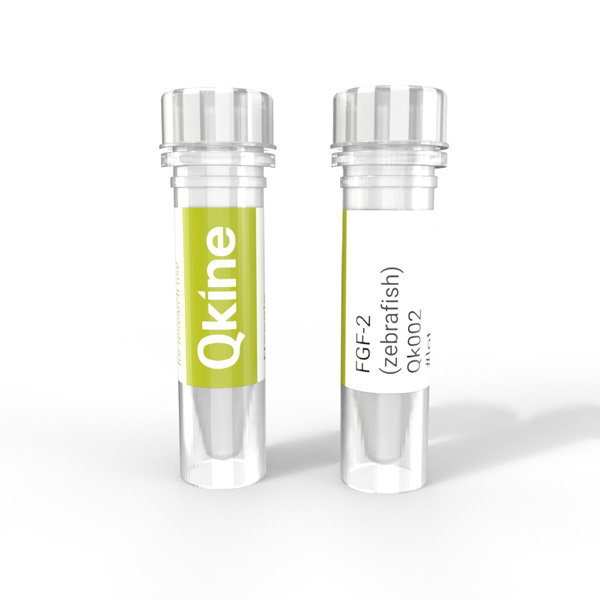
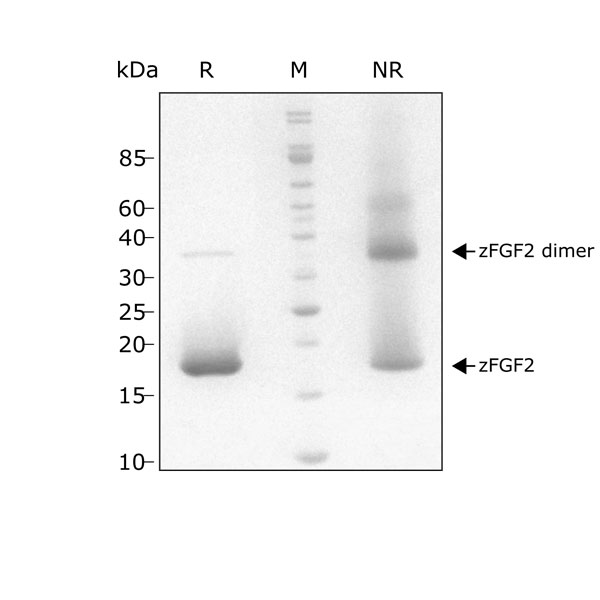
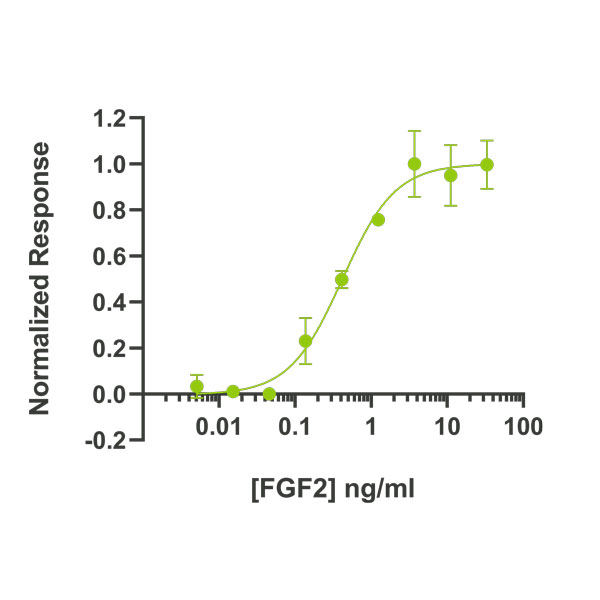

FGF2 for pancreatic cancer sphere systems
Stem cell researcher, University of Oxford, UK –
We have also used the FGF2 for pancreatic cancer sphere systems and it seems to support the growth of the cells as we would expect. University of Oxford, UK.
Upvote if this was helpful (0) Downvote if this was not helpful (0) Flag for removal